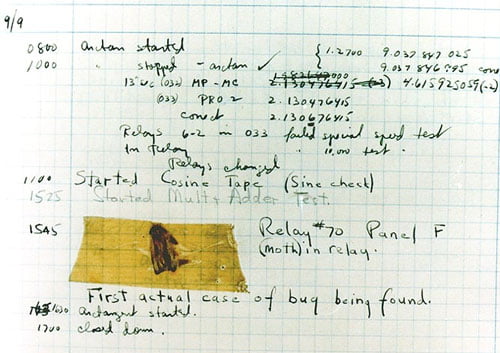Computer Bug Number 1
On 9th September 1947, while working on the Harvard University Mark II Aiken Relay Calculator, Grace Murray Hopper was having trouble getting the machine to work correctly. The calculator was a very simple computer using relay logic. Investigations revealed that a moth had become stuck between 2 of the relay points. After they “Debugged” the machine it worked correctly. And so the term Bug and Debugged became associated with computers.
As fate would have it, the report with the moth taped to it, remained in the Naval Surface Warfare Center Computer Museum at Dahlgren, Virginia, until in 1991, it made its way to the History of American Technology Museum, part of the Smithsonian.
The origin of Bugs
However this isn’t the first time the term ‘Bug‘ had been used in relation to technology. In the time of Thomas Edison it meant any defect in an industrial apparatus and in Hawkin’s New Catechism of Electricity, an 1896 electrical handbook from Theo. Audel & Co, we find the entry:
The term “Bug” is used to a limited extent to designate any fault or trouble in the connections or working of electric apparatus.
So the application to computers was natural. These days, we mostly think of bugs as flaws in software programs since that is where we spend most of our time Debugging.
Edsger W. Dijkstra once said , “If Debugging is the process of removing Bugs, then Programming must be the process of putting them in”.
Ray Keefe has been developing high quality and market leading electronics products in Australia for nearly 30 years. For more information go to his LinkedIn profile at Ray Keefe. This post is Copyright © 2011 Successful Endeavours Pty Ltd.




